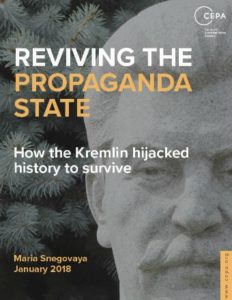 Transparency is the best way to combat Russian propaganda, argues M. Todd Bennett, an associate professor of history at East Carolina University and the author of “One World, Big Screen: Hollywood, the Allies, and World War II.” More information, not less, is the only way to win information warfare, he writes for The Washington Post:
Transparency is the best way to combat Russian propaganda, argues M. Todd Bennett, an associate professor of history at East Carolina University and the author of “One World, Big Screen: Hollywood, the Allies, and World War II.” More information, not less, is the only way to win information warfare, he writes for The Washington Post:
Over most of its 80-year history, FARA [the Foreign Agents Registration Act] has proved unable to regulate even the slow-moving flow of media such as pamphlets and books. As such, the statute, a legal relic of a bygone technological era, hardly seems adaptable to the Information Age of today when data crosses international borders at light speed. Yet FARA’s successful use of disclosure rather than censorship during World War II suggests how a democracy can effectively wage information warfare, despite the vulnerabilities that come with openness.
 A few months after the November 2016 election, Dipayan Ghosh quit his job at Facebook, where he worked on privacy and public policy issues. On Tuesday, a Washington think tank, New America, and Harvard’s Shorenstein Center on Media, Politics and Public Policy published a report he co-wrote, asserting that technology behind digital advertising — the financial lifeblood of Facebook, Google and Twitter — has made disinformation campaigns more effective, The New York Times reports:
A few months after the November 2016 election, Dipayan Ghosh quit his job at Facebook, where he worked on privacy and public policy issues. On Tuesday, a Washington think tank, New America, and Harvard’s Shorenstein Center on Media, Politics and Public Policy published a report he co-wrote, asserting that technology behind digital advertising — the financial lifeblood of Facebook, Google and Twitter — has made disinformation campaigns more effective, The New York Times reports:
“The problems were much broader than we imagined, and it was not just about one tool or platform,” said Mr. Ghosh, who with his co-author, Ben Scott, worked on devising Mrs. Clinton’s tech policy platform. “It’s the profit model underlying the whole digital advertising system.”….Fundamentally, the problem is that “disinformation campaigns and legitimate advertising campaigns are effectively indistinguishable on leading internet platforms,” Mr. Ghosh and Mr. Scott wrote.
Moscow’s influence within EU member states worries MEPs. While the main political groups condemn the interference of the Kremlin, Eurosceptics have no qualms about defending Vladimir Putin, EURACTIV France reports:
Elmar Brock was quick to set the tone of the debate on Russian propaganda during the European Parliament’s January plenary session. “By defending Russia, some here are defending their ideology which is not that of a liberal democracy,” the centre-right German MEP said in reference to the remarks made by Eurosceptic parties.
 Twitter accounts linked to Russian influence operations are pushing a conservative meme related to the investigation of Russian election interference, AP reports:.
Twitter accounts linked to Russian influence operations are pushing a conservative meme related to the investigation of Russian election interference, AP reports:.
The purported Russian activity involves the hashtag #ReleaseTheMemo, a reference to a secret congressional report about President Donald Trump’s allegations that he was wiretapped by the Obama administration. A group that tracks Russian-linked social media influence campaigns says the volume of Russian-related #ReleaseTheMemo traffic represents the most coordinated such effort since their website launched in early August.
 “I’ve never seen any single hashtag that has had this amount of activity behind it,” said Bret Schafer, an analyst who helps runs the Hamilton 68 dashboard, a project with the Alliance for Securing Democracy at the German Marshall Fund. It tracks about 600 accounts that it says are tied to Russian-sponsored influence and disinformation campaigns; most of those accounts were promoting the same meme Friday.
“I’ve never seen any single hashtag that has had this amount of activity behind it,” said Bret Schafer, an analyst who helps runs the Hamilton 68 dashboard, a project with the Alliance for Securing Democracy at the German Marshall Fund. It tracks about 600 accounts that it says are tied to Russian-sponsored influence and disinformation campaigns; most of those accounts were promoting the same meme Friday.
Internet utopianism
Karen Kornbluh, who served as Mr. Obama’s ambassador to the Organization for Economic Cooperation and Development, said that before the election, there was a view of “internet utopianism” in government, The Times adds:
Officials looked to the internet to solve problems in education, income inequality and global democracy. They called on tech executives to help with those initiatives and hired from Google and other tech outfits to bring their expertise into the White House.
“So if you were championing the best things about the internet, it was easy to be disappointed that it was hijacked to subvert the very things it could foster,” Ms. Kornbluh said. But she said few people in government were looking with a full view of how social media and other internet services posed national security, economic and other risks.







